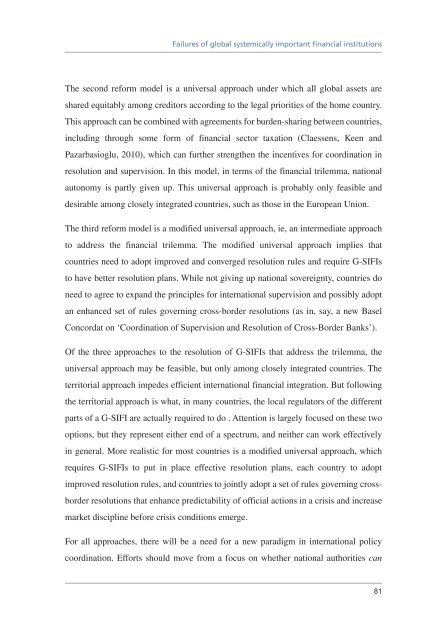Download PDF - Vox
Download PDF - Vox
Download PDF - Vox
- No tags were found...
You also want an ePaper? Increase the reach of your titles
YUMPU automatically turns print PDFs into web optimized ePapers that Google loves.
Failures of global systemically important financial institutionsThe second reform model is a universal approach under which all global assets areshared equitably among creditors according to the legal priorities of the home country.This approach can be combined with agreements for burden-sharing between countries,including through some form of financial sector taxation (Claessens, Keen andPazarbasioglu, 2010), which can further strengthen the incentives for coordination inresolution and supervision. In this model, in terms of the financial trilemma, nationalautonomy is partly given up. This universal approach is probably only feasible anddesirable among closely integrated countries, such as those in the European Union.The third reform model is a modified universal approach, ie, an intermediate approachto address the financial trilemma. The modified universal approach implies thatcountries need to adopt improved and converged resolution rules and require G-SIFIsto have better resolution plans. While not giving up national sovereignty, countries doneed to agree to expand the principles for international supervision and possibly adoptan enhanced set of rules governing cross-border resolutions (as in, say, a new BaselConcordat on ‘Coordination of Supervision and Resolution of Cross-Border Banks’).Of the three approaches to the resolution of G-SIFIs that address the trilemma, theuniversal approach may be feasible, but only among closely integrated countries. Theterritorial approach impedes efficient international financial integration. But followingthe territorial approach is what, in many countries, the local regulators of the differentparts of a G-SIFI are actually required to do . Attention is largely focused on these twooptions, but they represent either end of a spectrum, and neither can work effectivelyin general. More realistic for most countries is a modified universal approach, whichrequires G-SIFIs to put in place effective resolution plans, each country to adoptimproved resolution rules, and countries to jointly adopt a set of rules governing crossborderresolutions that enhance predictability of official actions in a crisis and increasemarket discipline before crisis conditions emerge.For all approaches, there will be a need for a new paradigm in international policycoordination. Efforts should move from a focus on whether national authorities can81














